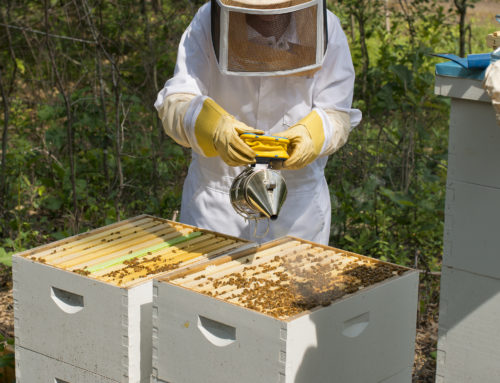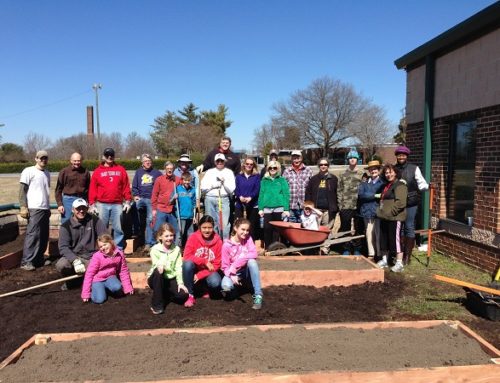A Visit with the Oakley Community Garden in Asheville, North Carolina
Rev. Shelly Webb’s eyes light up when she talks of the transformative powers of a garden. She has experienced first-hand how a vacant lot in a tumbledown neighborhood can end up being a force for good in the community. She has witnessed an elderly woman in her eighties, who had thought her life was over, gain a new purpose in life when she resurrected her husband’s old garden hoe and put it to use in the garden. She has seen neighbors exchanging greetings and coming together for harvest meals in an area where people previously stayed inside their homes and didn’t venture out in the neighborhood. She has seen young and old, all faiths and races work side by side as they sowed, nurtured and harvested plants in a community garden. She knows that more than plants grow in such a garden. She has seen relationships grow. She has seen community grow. She knows the harvest is bountiful.
“. . . more than plants grow in such a garden. She has seen relationships grow. She has seen community grow. She knows the harvest is bountiful.”
When Shelly landed in east Asheville, North Carolina, in 2010 to serve as the pastor of the Oakley United Methodist Church, it wasn’t of her own choosing. She had lost a job she loved as a chaplain at Brevard College, where she had worked for 8 years. She loved college ministry and had even started a community garden on the campus. Her interest in faith and food brought her together with others to discuss justice matters centered on faith and food. How do we feed the hungry? How do we address food deserts? What are we called to do as people of faith when we have hungry children around us? She wanted to answer these questions where she was.
She came face to face with these questions in her new community. Her new congregation was what she described as a dying church. It was in a part of the city that was a bit ramshackle and rough. Shelly put it nicely when she said the area was in “a mismanaged pocket” of the city. As many neglected and overlooked areas are, it was a food desert. There were no grocery stores or farmers markets. Eighty percent of the children who attended the school just two blocks away were impoverished and received subsidized breakfasts and lunches (the average for North Carolina is 69%).
But where some people may not see much hope, Shelly recognized some important characteristics of the community. “I could tell the people of Oakley wanted a simple life,” she explained. “People were reclaiming old abandoned housing. The houses were small but there seemed to be a desire for a more wholesome life with neighbors you talked to.” One of the problems that Shelly knew her small congregation needed to overcome was its isolation. “People would not come inside to worship,” she explained.
This young pastor has a knack for recognizing resources and gifts though. In this case, it was a large plot of land behind the church and a handful of aging parishioners willing to listen to new ideas and give them a try. She proposed a garden. With a mission to create community for body, mind, soul and spirit, the small congregation set to work. Shelly had a connection at nearby Warren Wilson College and she sought their help.
“They taught us the best orientation of the garden, how to plant and what grew well together.” “It may be shocking in some ways,” Shelly says, “but we just followed the Spirit without much of a road map. It’s amazing how things came together and evolved based on what the community needed.” 
She says that numerous churches ended up calling her for how-to advice when they learned of the garden’s success. She stresses that instead of following a how-to guide, it’s important to be attuned to what the community needs, where its interests lie and to not be afraid to take risks or of being afraid to fail.
“Don’t form too many committees,” she advises. “You can over plan and over analyze. We discovered we didn’t have to convince a lot of people to plow up the church yard. They were desperate; they were willing to do anything to help build community.” Behind the church, people gathered to build raised beds and a garden shed to store garden tools. The area became a magnet, drawing people to it to see what people were working on. People stayed and began to help. Tiny seeds and seedlings went into the ground. Neighbor met neighbor. The garden begat surprise after surprise, blessing after blessing.
Among some of Pastor Shelly’s favorites:
- An 84-year-old widow “had gone inside herself,” not having much to live for, or so she thought. She unearthed her old garden hoe from her garage and began working in the garden and relishing the fact that its harvests helped feed the hungry. She began to share her knowledge with younger people. She reconnected to her deceased husband in that she was now enjoying gardening, something he had always loved. “She found life again in the garden,” says Pastor Shelly. “It was absolutely beautiful. She will tell you that the garden saved her life. In fact, our entire church found life again in the garden.”
- A pregnant teenager and her Dad visited the garden. The young girl had never seen a carrot come out of the ground before, much less taste just-harvested food. She had the chance to try the carrot and learned that it’s awesome to eat fresh food.
- The garden led to a farmers market in the neighborhood. All it took was Shelly to put a sign on the church marquee, “Interested in a farmers market in Oakley?” and the people in the community helped make it happen, from permits to funding to farmers. “The people of the church always lamented that they wished we had children here. Turns out, every Thursday we have children running through the garden and visiting the farmers market.”
- Fresh tomatoes abounded the first year and they helped bring a closer connection to an Alcoholics Anonymous (AA) group that met at the church. “There is a difference between giving AA space to meet and giving them a space to meet and then inviting them to come into your garden to share your tomato harvest. The garden brought people together and made them feel part of the community.”
- A natural progression of raising a garden is to find ways to preserve the bounty. One of the surprises was how willing people were to remember how they preserved food and how willing they were to share that. “I think it is a holy act to remember,” says Shelly. “We have a new generation wanting to savor food and to taste good food. To savor the act of passing down how to can . . . to watch someone with arthritic hands can green beans . . . it is powerful.”
“I think it is a holy act to remember. We have a new generation wanting to savor food and to taste good food. To savor the act of passing down how to can . . . to watch someone with arthritic hands can green beans . . . it is powerful.”
- Even for shut-ins, the garden enriched their lives. “It gave them something to talk about aside from their illnesses,” says Pastor Shelly. “People were pleased to hear about the garden and the farmers market. They wanted to see it. They began sharing gardening tips they remembered, Farmers’ Almanac-type advice, like when or how to plant, or using eggshells to add nutrients.”
- When a Hindu family in the neighborhood experienced a tragedy, this new community – built row by row, seed by seed, vegetable by vegetable, giving people what they needed when they were hungry – responded as a community with love, concern and respect.
- The congregation grew by about 25 members. “But there was more growth than numerical growth,” says Shelly. “It was in the spirit of the place, in the community. “ The church is now a vibrant community resource.
 “Eating is such a common denominator to all of humanity,” says Shelly. “We all have to eat to survive. And food always tastes better when everyone has enough, when food is shared around a common table, and when it is grown with love and hope.”
“Eating is such a common denominator to all of humanity,” says Shelly. “We all have to eat to survive. And food always tastes better when everyone has enough, when food is shared around a common table, and when it is grown with love and hope.”
Editor’s Note






